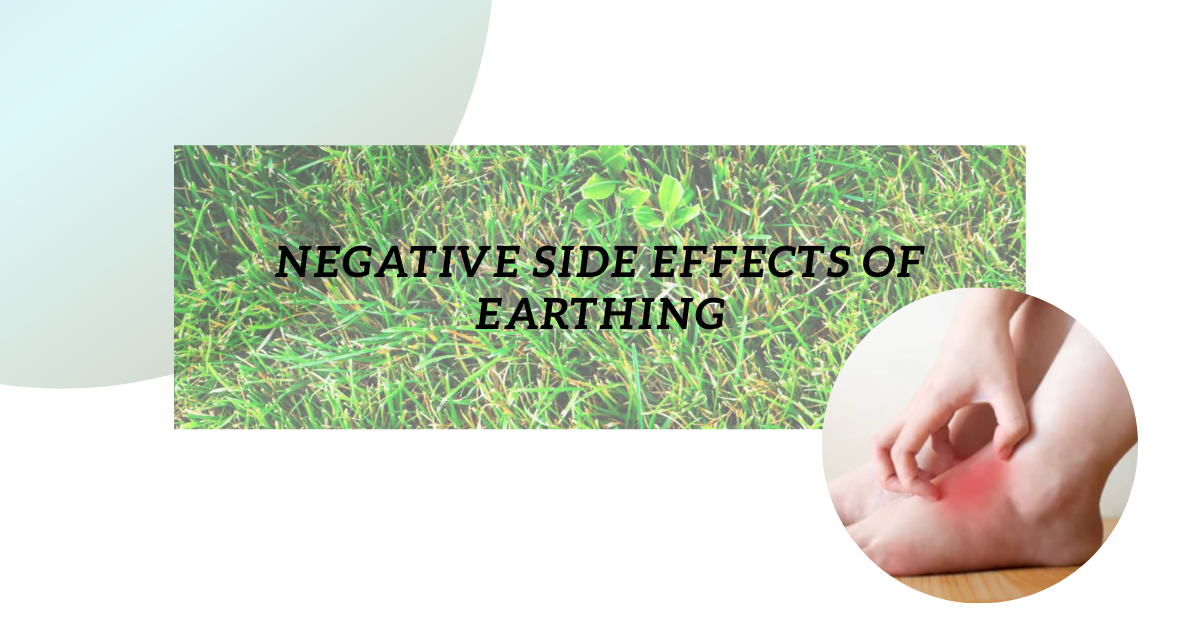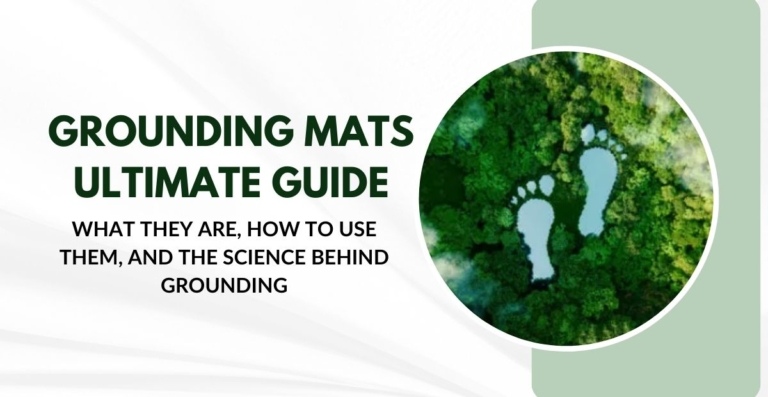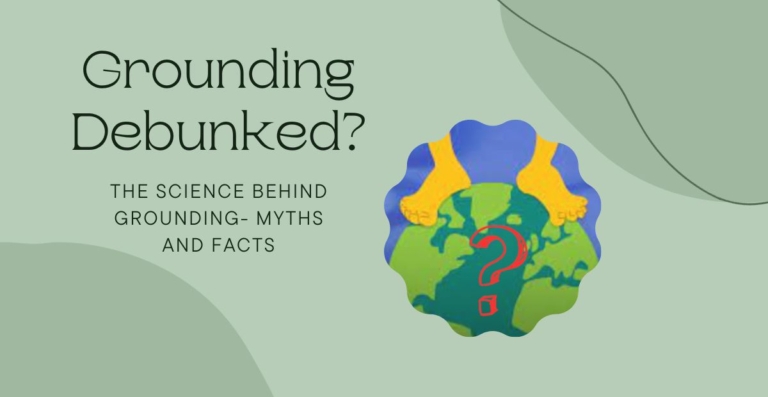5 Negative Side Effects of Earthing- What You Should Know

Some call it earthing, some call it grounding.
I, as a grounding enthusiast, have not decided which term I prefer to use, despite my many hours of research into this phenomenon!
Since I’m an MRI Technologist, I spent two years learning how our bodies interact with magnetism and electricity.
I now use this knowledge daily, taking diagnostic medical images. I also practice electrical safety to ensure my patients have a safe experience in the MRI.
In my many hours of studying earthing, I concluded it does come with many benefits. Whether you’re using a mat, or sheet, or simply stepping outside.
But there’s a catch.
Hold onto your shoes,
In this post, I’m uncovering the less-than-sunny side of Earthing. From detox symptoms to electrical hazards, there’s more to know about the negative side effects of earthing.
Table of Contents
What Is Earthing?

Earthing is the practice of connecting yourself, via skin contact, to the earth’s natural electric charge.
This can be done by touching soil, sand, grass, or concrete barefoot. It can also be done indoors with grounding mats and bedsheets.
This allows us to soak up electrons, and balance out our body’s electric charge.
Well, great!
But what can this do for us?
Health benefits have been known to include:
- better sleep
- enhanced mood
- increased energy
- pain relief
- stress reduction
- reduction in inflammation
While the benefits of earthing are widely praised, we don’t often hear about the possible negative side effects of this practice.
It is important to be aware of this so that we can practice earthing safely.
The Top 5 Negative Side Effects of Earthing
1. Risk of Electrical Hazards
Most people think of grounding as running through grassy fields barefoot. While that’s true, you can also ground in the comfort of your own home, an introvert’s paradise.
To do this, you need some grounding equipment, such as grounding sheets or mats.
As with any product that involves wires or conductive fibres, it is wise to be mindful of how you use them.
Most products will require you to plug the cord into the grounding port of your electrical outlet.
Make sure you know how to use your grounding mat or sheet.
If you are old enough to read this, then surely you know not to mix electrical things with water.
The same goes for grounding equipment. Don’t use it in the bath.
Also, consider if your house has been wired properly. Are the electrical components of the outlet extremely old or in disrepair? If so, it may be a good idea to use your grounding products elsewhere.
2. Increased Exposure to Outdoor Toxins And Germs

I have a big stretch of city grass outside my house. I have stood out there barefoot several times.
I have also witnessed many neighbourhood dogs popping a squat on that grass.
My city also sprays glyphosate (a weed killer) all over the grass near the beach.
This makes me cringe internally as I can’t help but think, “What was I standing in/on while grounding yesterday?”
I have not come across any real evidence that grounding outdoors increases your risk of exposure to pollutants or germs. I also have never experienced any infections or reduction in quality of health since I started grounding.
That being said, I still think it’s important to be preventative.
What I do to minimize exposure:
- I stick to areas close to home, within water hose reach. I spray down the grass for a few seconds and stand in that spot. (BONUS: water helps make grounding more effective since it is a conductor of electricity).
- I have nearby access to a rather crowded beach (first-world problems). I walk down to where the edge of the water and walk in the sand there.
- Obviously, avoid spots that have been recently fertilized or sprayed with pesticides or herbicides. If you don’t know, don’t go. Stick to an area you are familiar with.
- Wash your feet when you get home with some good-quality soap.
- Lastly and most obviously, keep clear of areas where there may be glass or used needles (and while you’re at it, don’t eat Tide Pods).
3. Allergic Reactions
If you have allergies or sensitivities, it’s good to be aware of these when you decide how you want to practice grounding both indoors and outdoors.
Outdoors
Are you allergic to grass? Have seasonal allergies? Then maybe standing outside barefoot on the grass during spring and summer isn’t the best for you.
Concrete pads (without paint or sealer) do conduct some electricity, as long as they are directly overtop of the dirt. This can include a raw basement floor or the floors of your garage!
Otherwise, if you’re like my dad and suffer from seasonal allergies, maybe opt for grounding indoors.
Indoors
Check the materials of your grounding sheets and mats before you buy.
All mats and sheets must contain a conductive material. This includes carbon, silver fibres, or stainless steel fibres.
These fibres are then woven into other materials such as cotton, polyester, nylon,
Carbon coated mats or sheets are a good option, as carbon is known to be hypoallergenic. However, it is also less conductive than silver and stainless steel. So you’ll still get the benefits, just not as effectively.
4. Discomfort For Electro-hypersensitive Individuals
Electro-hypersensitivity (EHS) is a neurological disorder that makes its sufferers more susceptible to the negative effects of EMF (electromagnetic frequencies).
Symptoms can include:
- fatigue
- difficulty concentrating
- nausea
- dizziness
- tingling and burning sensations
- digestive disturbances
According to Gaetan Chevalier, Ph.D and director of the earthinginstitute.net, EHS individuals may experience temporary discomfort while grounding in the initial stages. They can eventually benefit from earthing and the discomfort should go away after awhile.
What can you do?
Start slow and gradually increase the frequency and time spent grounding. If discomfort gets too intense, take a break and come back to it once the symptoms have subsided.
5. Detox Symptoms
Again, I struggled to find any real scientific evidence showing that people experience detox symptoms due to grounding.
But, I came across talk of people experiencing what is called a Herxheimer (herx for short) reaction after grounding.
A herx reaction is your body responding with flu-like symptoms in response to detoxification.
When you start a healthy routine and support your body with grounding, your body may dig up some old bacteria or deal with some junk it wasn’t able to before.
This then enters the bloodstream so that it can be filtered through your liver and kidneys, and then excreted.
Your body may need to ramp up some healing mechanisms to assist in the detox.
Symptoms can arise from this, such as:
- headache
- fever
- fatigue
- nausea
- chills
What can you do if you experience this after grounding?
- Support your body in its healing by drinking lots of water, getting lots of rest, and eating a clean and healthy diet.
- If you are already doing other detoxing protocols and experience a herx reaction, you may want to save the grounding for after you are finished. Keep it simple and gentle.
- Listen to your body, you can always take breaks from grounding and come back to it when you feel ready.
The Good News
Now, that all seemed very negative, didn’t it?
So let’s balance the charge with some good news!
A study, published in the Journal of Inflammation Research states that grounding outside in connection with the Earth comes with ZERO negative secondary effects.
Why?
Because humans are designed to interact with the Earth and have been doing so for thousands of years.
So if you are skeptical of the safety of using mats or sheets, then outdoor grounding can be a great way to soak up those electrons, free of worry.
More Side Effects? Debunking Common Myths
While there is some science supporting earthing, there are also a lot of myths and misconceptions.
While thoroughly researching this topic, I did come across a discussion of additional side effects that didn’t make it onto my list. These were mostly from other blogs, such as Greenmatters and Plantmeditate.
These so-called side effects didn’t make the cut because one or more of the following:
- I couldn’t find scientific articles supporting them
- I couldn’t find any discussion of people anecdotally experiencing them
- There is scientific evidence to support that grounding helps these side effects
So what are these side effects not worth mentioning?
Higher Anxiety
Here’s a study (https://pubmed.ncbi.nlm.nih.gov/18047442/) showing that grounding during sleep led to a normalization in cortisol levels.
Exposure to “dirty electricity”
According to chintglobal, dirty electricity happens when an electrical device alters the current (as in changing AC to DC and vice versa).
So does this apply to grounding devices?
A grounding mat is only plugged into the wall via the grounding port. I scoured the internet to see if I could find evidence that grounding could expose you to this type of phenomenon.
Spoiler alert, I couldn’t find anything.
Disruption of Sleep Patterns
I was reluctant to even mention this one, as earthing has been known to help people sleep better.
I have a neighbour who tried sleeping on a grounding mat and was shocked (pun intended) when she divulged that her sleep seemed to be disrupted.
However, I couldn’t find any supporting research or anecdotal mentions of this.
There could also be other reasons she didn’t sleep well. Such as the specific grounding mat she used was hot or uncomfortable. Sleep may also be disrupted if you are experiencing herx symptoms, as mentioned above.
Otherwise, I could find no research that could indicate that earthing can disrupt sleep patterns.
I have found that on days that I ground, I sleep better than on days that I don’t. I also find I feel more calm and less anxious.
How To Practice Safe Earthing Indoors
Part of making sure you practice safety while using your earthing devices is making sure they remain in good condition.
Below, I go over some of my top tips and tricks to ensure your mats and sheets last as long as possible and that your body is adequately prepared to handle the changes grounding may bring.
1. Check Your Mats Or Sheets To Make Sure They Are In Good Condition.
- No tears in the fabric or material
- The cords have no exposed wire
- The prong that plugs into the wall is in good condition and is not bent
2. Make Sure Your Electrical Outlet Is In Good Condition
- The wall plate is well-seated
- The prong from your grounding device plugs in firmly into the grounding port
- There are no exposed wires
- The electrical plug is firmly in place and not loose
3. Make Sure There Is No Water Nearby
Avoid using grounding devices in areas where water may pool or splash
4. Support Your Detox And Drink Plenty Of Water
5. Avoid Using Lotions/Oils With Your Grounding Device
Lotions/Oils can not only wear the fabric down and make it less efficient by causing oxidation of the conductive fibres.
They can also build up in the other materials leading to more washing, wear, and tear.
6. Try To Avoid Sweating Too Much
As with lotions/oils, sweat may cause oxidation of the silver fibres in the mat or sheet.
Some moisture is necessary to help the transfer of electrons. Just not so much that you are dripping!
If you think you might be using your device where you will sweat more (like during sleep or yoga) then opt for a device that uses stainless steel as the conductive material.
This will help avoid breakdown leading to a longer lifespan of the product.
Alternatives to Earthing
If for some reason you don’t think earthing is right for you, there are some things you can do to lessen your exposure to
One thing you can try is to avoid spending too much time on electronics.
- Go a few days a week without your smartwatch or try not to use it at all
- Sleep with your phone farther away
- Unplug unnecessary electronic when not in use
- Take breaks away from your computer and phone at work. Read a book or go for a walk
These practices can help reduce the
Conclusion
When researching this topic, I spent a good amount of time looking at published studies. I also used my own experience, the experience of my family and friends, and testimonials I have found online.
Overall, there were VERY FEW personal complaints when it came to grounding. Most of the side effects I found were simply being parroted from one blog post to another without any real scientific evidence to back it up.
This was true for the complaints of higher anxiety, exposure to dirty electricity, and sleep disruptions.
Otherwise, most of the side effects listed boiled down to using common sense. If you practice grounding safely, as I do, you should have little to no issue.
As with all things health and wellness, talk to your trusted healthcare professional to find out what is best for your unique situation.






